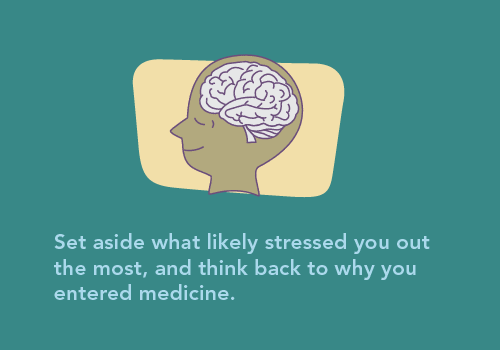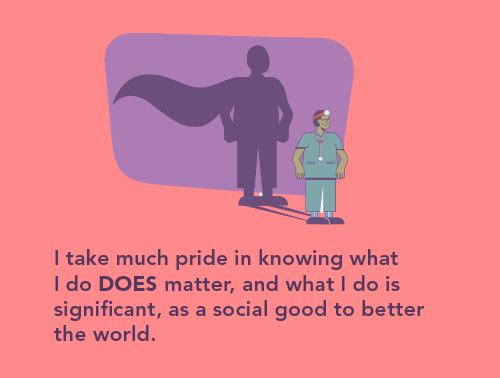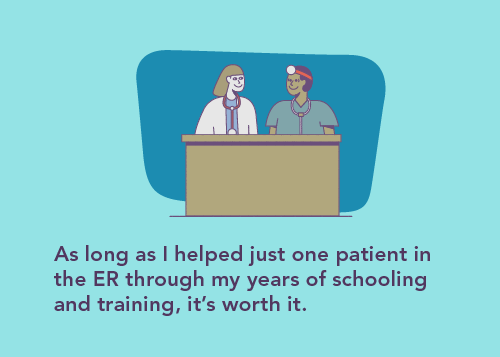
Emergency medicine physician, Ripal H. Patel, MD, MPH, gives his advice on how to deal with the pressures of being a doctor without quitting medicine.
The road to MD was never easy for me. I am terrible at memorizing, even worse at standardized exams. As I progressed through college, that dream of becoming a physician kept sparking in my mind, and I kept trying to smother it. Some of it was out of fear: fear of wanting something so badly—and believing that this was truly the direction my life needed to take—but that I might not achieve it.
Daydreaming about the future in medical school
I remember sitting in college in a musty, dimly lit library at 2 a.m. I was taking a study break from endless memorizing of plant biology (yes, another rite of passage to medical school). I sighed and performed a ritual I always followed at times like this. I went to the medical school admissions website to look over incoming class photos, read about the curriculum, and indulge in the idea that it could be me.
To this day, I could probably verbatim recite the contents of the websites for Cornell, NYU, UT Southwestern, and Drexel. I would even delve into residency pages, looking forward, and imagining myself as one of the faces on their intern year roster. Then, with a sigh, back to my cubicle to rote memorize the Kingdom, Phylum, Class, Order, Genus, Family…wait…or is it Family, Genus… God who cares!
A dream come true: I'm a physician!
Eventually—through what seems like a blur—it all came to fruition. Medical school, residency, crushing board exams, and now, I’m eight years into being an attending. As I sit in a coffee shop ruminating about it all, I think about that blaze of wanting it so badly. Now that the journey is over, I realize it was all worth it.
Getting to work as an attending. Taking charge of patients and their health often during their most critical times. Being on faculty teaching medical students and residents, and then watching them become leaders in the field as they care for patients in the same manner. It was worth it.
I still stand by that. The road wasn’t easy, but perhaps that—and all the sacrifices made—has carried me through what we confront now.
Practice medicine your own way: A doctor’s story
Is quitting medicine worth it?
I can’t say I am much for social media. That’s a separate rant. But amazingly enough, Facebook has targeted me with ads (probably as it has to you) based on where I stop to look and click. Once I clicked on a physician who created a video lamenting the state of the healthcare system, decrying being a doctor, and encouraging the viewers to purchase his videos to “get out of it.”
There are side hustles galore that say you don’t have to practice medicine anymore. Because who would want to do that? Who would want to help people in their most vulnerable state? Use science to cure the sick and dying? Be a force and a leader during a global pandemic? Represent a time-honored profession that has been around since the dawn of time? (Sorry, big tech and private equity, you don’t have a reign there.)
Healthcare as big business
But let's accept one thing: Healthcare has gone corporate, and seriously corporate. My own specialty is dominated by mega-staffing companies that are, in turn, owned by larger private equity companies. And circulating around them are the baby staffing companies. Like a game of PAC-MAN, the smaller ones want to get large enough so they can eventually be gobbled up by a bigger one, and the owners can extend their golden parachutes and cash out. And while they sail off in a blaze of money, physicians stand there dumbfounded, wondering what happened.
Those are the facts. Love it or hate it, that is it: a massive chunk of GDP. And ultimately, they’re trying to slash pay on the most expensive component in that equation, the providers.
Find greater fulfillment in medicine
I call that system imperfect. But I also say, we should do what we can to protest against it. However, I don’t see it changing significantly in my lifetime.
The system is imperfect, but there still exists fluidity. What do I mean by that? So long as the pay is adequate (and the conditions are not entirely egregious), I try to be perfect within an imperfect system.

Set aside what likely stresses you out the most—the confines of the system—and think back to why you entered medicine. For most of us, it was a calling. We wanted to use our determination, intelligence, and compassion to assist those who are less fortunate and count on us. So why would we allow a broken system to repel us from a specialty grounded on such sanctity? And, coming from someone who has had jobs prior to medicine, no job is ever perfect!
Physician Sentiment Survey: How physicians feel about their work (Weatherby Healthcare)
Alternatives to quitting medicine
One solution to the problem for me has been locum tenens. But let me stress: It is just one method that I carved out.
I took a long look at my specialty and the road ahead and realized, quite simply, that having PRN jobs in multiple institutions, states, and practice models was the best way forward, like a diversified investment portfolio. Some places I work have hardly any institutions suffocating me; others have more. But the ones that have more, often have extremely poor, sick patients that need good quality medical care.
With such a liberated practice model and such fluidity, I go to work ignoring asinine business-driven metrics and focus on being efficient with my patients. I try to move faster for those that don’t need emergency care, but really pause and slow down for those that do. I relish more in history, doing proper exams, and spending just a few more seconds talking to my patients. I connect with them, hear their stories, and develop a deeper bond. I take great pride in knowing that what I do matters and is significant as a social good, helping to better the world.

Locums is just one option. But so many others exist, such as opening your own practice or clinic, doing charity work, staying PRN at several places in your city, and creating your own schedule, having side jobs so you can go down to part-time, etc.
New to locums? Learn from a pro
You CAN make a difference in medicine
I always like to harken back to the days when my dad began in the medical profession. Charting, billing, and the structure were simpler. There wasn’t as strong a drive for metrics or patient satisfaction surveys, and hospitals weren’t as easily getting gobbled up left and right by bigger systems.
Perhaps with that came more cohesion and a feeling of belonging, both to the hospital and to the community. My father is in his late 70s now, but he still gets up at three in the morning to begin getting ready for procedures and seeing patients in the clinic. My father loves the routine and cherishes how much his patients rely on him, his compassion, and his decades of experience. He also values more than just healing; he finds joy in seeing his staff and colleagues, keeping up with new innovations, and guiding his younger partners as they begin their careers in medicine.
My sisters keep asking why he will not stop working, and he smiles and answers quite simply that, to him, early retirement is early death. Or as he likes to say: “What am I going to do? Most of my friends do Bingo or play cards. I hate Bingo, and I don’t know how to play cards. So why not keep practicing medicine if I still am able to?”

I think he and I both share large ambitions for medicine these days, but as long as I helped just one patient in the ER through my years of schooling and training, it’s worth it. Anything beyond that is just icing on the cake.
One doctor’s perspective: How locums helped my career
Change your expectations to combat physician burnout
And so I go back to state emphatically that quitting medicine is not the answer. What is? Managing your expectations and navigating through an imperfect system that we often do not have control over.
COVID was bad for my specialty, with staff getting sick, patients refusing vaccines, and hospitals cutting physician pay and hours due to lower volumes. But I still felt significant, important, and, despite exhaustion, blessed to help those who needed it.
I did and continue to do my best despite all the challenges. With the attitude that I am my own entity and my own practitioner, I feel much more connected to the field. We all speak of work-life balance, but who knows what that really means? As many studies show, we are much happier at work than we think, and we are actually unhappier on our days away from work than we expect.
Through my own model of practice, I can prioritize my relationships, hobbies, and time off, while also contributing to patient care. And I can do it all while realizing I have so many contracting positions to work at that none of them has a sphere of influence over me. And that alone makes me happy.
Realign your relationship with medicine
So what are you going to do to reinvigorate yourself back into medicine? Purchase the “Quit Medicine and Do Real Estate” course, or will you take an inward journey to ask what you can do to be happier at work? Sometimes that may come with sacrifice or an unconventional answer (like traveling and locums). But either way, your specialty needs you, and more importantly, so do your patients.
How I reinvigorated my career: Dr. Patel's story of giving back in underserved communities: